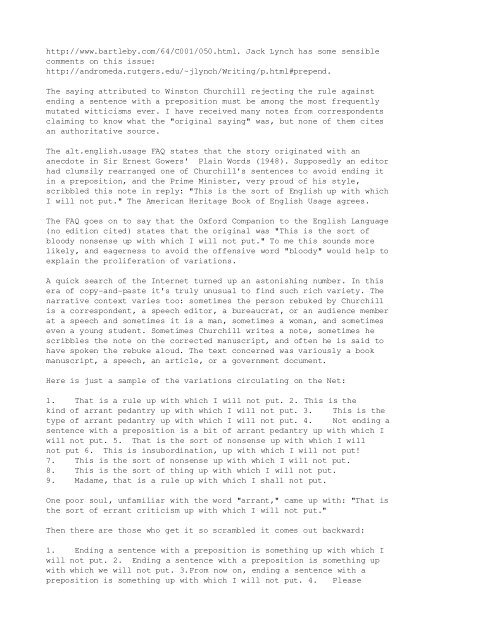Common_Errors_in_English_usage
Common_Errors_in_English_usage
Common_Errors_in_English_usage
Create successful ePaper yourself
Turn your PDF publications into a flip-book with our unique Google optimized e-Paper software.
http://www.bartleby.com/64/C001/050.html. Jack Lynch has some sensible<br />
comments on this issue:<br />
http://andromeda.rutgers.edu/~jlynch/Writ<strong>in</strong>g/p.html#prepend.<br />
The say<strong>in</strong>g attributed to W<strong>in</strong>ston Churchill reject<strong>in</strong>g the rule aga<strong>in</strong>st<br />
end<strong>in</strong>g a sentence with a preposition must be among the most frequently<br />
mutated witticisms ever. I have received many notes from correspondents<br />
claim<strong>in</strong>g to know what the "orig<strong>in</strong>al say<strong>in</strong>g" was, but none of them cites<br />
an authoritative source.<br />
The alt.english.<strong>usage</strong> FAQ states that the story orig<strong>in</strong>ated with an<br />
anecdote <strong>in</strong> Sir Ernest Gowers' Pla<strong>in</strong> Words (1948). Supposedly an editor<br />
had clumsily rearranged one of Churchill's sentences to avoid end<strong>in</strong>g it<br />
<strong>in</strong> a preposition, and the Prime M<strong>in</strong>ister, very proud of his style,<br />
scribbled this note <strong>in</strong> reply: "This is the sort of <strong>English</strong> up with which<br />
I will not put." The American Heritage Book of <strong>English</strong> Usage agrees.<br />
The FAQ goes on to say that the Oxford Companion to the <strong>English</strong> Language<br />
(no edition cited) states that the orig<strong>in</strong>al was "This is the sort of<br />
bloody nonsense up with which I will not put." To me this sounds more<br />
likely, and eagerness to avoid the offensive word "bloody" would help to<br />
expla<strong>in</strong> the proliferation of variations.<br />
A quick search of the Internet turned up an astonish<strong>in</strong>g number. In this<br />
era of copyandpaste it's truly unusual to f<strong>in</strong>d such rich variety. The<br />
narrative context varies too: sometimes the person rebuked by Churchill<br />
is a correspondent, a speech editor, a bureaucrat, or an audience member<br />
at a speech and sometimes it is a man, sometimes a woman, and sometimes<br />
even a young student. Sometimes Churchill writes a note, sometimes he<br />
scribbles the note on the corrected manuscript, and often he is said to<br />
have spoken the rebuke aloud. The text concerned was variously a book<br />
manuscript, a speech, an article, or a government document.<br />
Here is just a sample of the variations circulat<strong>in</strong>g on the Net:<br />
1. That is a rule up with which I will not put. 2. This is the<br />
k<strong>in</strong>d of arrant pedantry up with which I will not put. 3. This is the<br />
type of arrant pedantry up with which I will not put. 4. Not end<strong>in</strong>g a<br />
sentence with a preposition is a bit of arrant pedantry up with which I<br />
will not put. 5. That is the sort of nonsense up with which I will<br />
not put 6. This is <strong>in</strong>subord<strong>in</strong>ation, up with which I will not put!<br />
7. This is the sort of nonsense up with which I will not put.<br />
8. This is the sort of th<strong>in</strong>g up with which I will not put.<br />
9. Madame, that is a rule up with which I shall not put.<br />
One poor soul, unfamiliar with the word "arrant," came up with: "That is<br />
the sort of errant criticism up with which I will not put."<br />
Then there are those who get it so scrambled it comes out backward:<br />
1. End<strong>in</strong>g a sentence with a preposition is someth<strong>in</strong>g up with which I<br />
will not put. 2. End<strong>in</strong>g a sentence with a preposition is someth<strong>in</strong>g up<br />
with which we will not put. 3.From now on, end<strong>in</strong>g a sentence with a<br />
preposition is someth<strong>in</strong>g up with which I will not put. 4. Please





